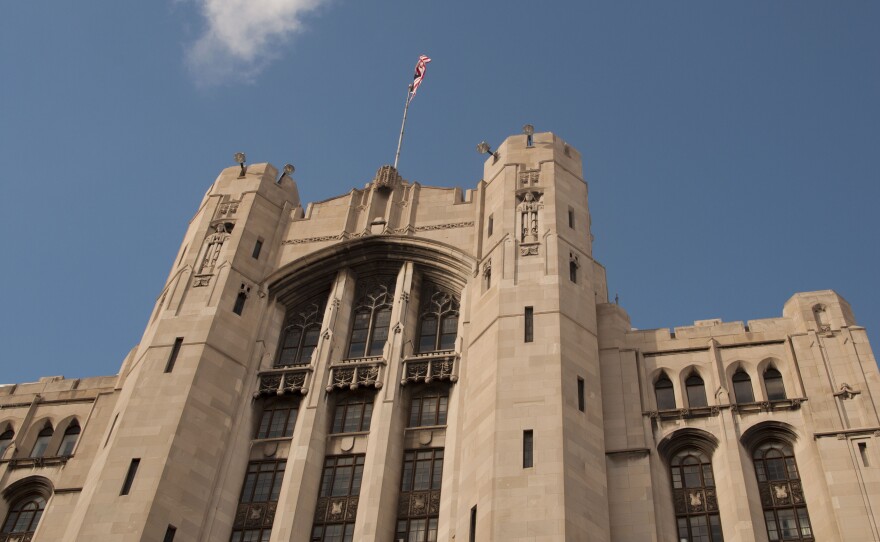
Ypsilanti's Sue Webster visited the Detroit Masonic Temple twice (once for the Theatre Bizarre masquerade, and once for a lecture). Her visits piqued her curiosity, so she posed her question to our MI Curious project.
“There must have been a huge presence at the Masonic Temple in Detroit at one time. What was it all about?”
Detroit's Masonic Temple is a gray stone building that towers over Cass Park.
The ceilings are painted, the bathrooms are overflowing with marble and the are wooden phone booths decorated with swirling hand carved flourishes. They don’t have phones in them anymore though.
Finding our way inside the Masonic Temple

Sue and I went to the Masonic Temple to meet with John Snider, the Temple's docent. We found him in the Temple’s library, sitting comfortably in plush armchair, smoking a cigar.
On either side of him were two large windows with red curtains, the rest of the room filled with stacks of flaking maps and books. The other worldliness of the scene was interrupted only when his cell phone pinged.
He told us to pull up a chair, and then let us pepper him with questions.
How many rooms are there in this building? Is there really a pool? What even is a mason? And how did they have enough money back in the day to pay for this place?
“It’s not a simple answer,” he began. “You’re assuming traditions that apply now, that did not apply then.”

That’s kind of how all of John Snider’s answers start, and then they wind through history, astrology, geometry, philosophy. He questions your assumptions and pulls out obscure historical knowledge about the Michigan-Ohio border dispute.
Basically it comes down to this
There were a lot of freemasons in the 20s because it was just the thing to do.
“It was something people did before we had radio, before we had television,” said Joel Stone, chief curator at the Detroit Historical Society. “People would go out and talk to each other.”
He said there were a bunch of these kind of social clubs in Detroit back in the day. Some were secretive like the freemasons, some weren’t.
Men were usually part of a couple different groups, so obviously many big Detroit names (Lewis Cass, Augustus Woodward, Henry Ford) were all freemasons.

This was also Detroit at its prime, so there was a lot of money in the city. Just like today, the temple was always open to the public to host events.
They knew they had to in one way or another pay for this building so they included the ballrooms where lots and lots of big events have been held,” said Stone.
At least, until the depression hit
After that, in the late 50s and early 60s, Stone says the upper Cass Corridor started transitioning into Detroit’s skid row after the Black Bottom neighborhood was bulldozed to make way for I-75.
"Black Bottom had been where most of the city's down-and-out lived, with its destruction, they gravitated to upper Cass. By the early 1970s, the corridor was no longer a fashionable place to live - in fact it was pretty seedy," Stone said.
He says there were other factors that contributed to the Temple's decline as well, such as the availability of more entertainment choices (a new Cobo Hall, and a renovated Fisher Theatre), and a decline in the popularity of social clubs.

"Naturally, the decline downtown was gradual, but I would suggest that changes in the neighborhood, changes in entertainment choices, and changes in social activity were all in decline by the mid-1960s," says Stone.
Today the area is on an upswing, but the Masonic temple has rumors floating around it. Mostly that it’s haunted.
Part of that probably has to do with the mysterious organization that built it.
Sue told me she’d heard of the Masons, but never really knew what it was they did or do. She knew they were maybe kind of secret. There were movies about them.
But here’s the thing: the masons aren’t exactly hiding.
As Alex Lundberg, a freemason who wrote a book about the Temple, puts it: they “are a vastly secret organization with a fourteen-story building on Temple avenue.”

Snider says they’re not secret, they’re just private. He’ll answer most anything, you just have to ask. It’s just that not many of us think to.
And the questions they won’t answer? It’s mostly about the specifics of their lectures and teachings … but it sounds like the gist of it is just how to be an upstanding dude.
“The secrets are more mundane than you would think,” Lundgren said. “There is no weather machine.”
Sometimes the idea of a secret is just a lot more exciting than the secret itself.
*Editor's Note: There are more pictures, including a peek inside a lodge room. Make sure you click through the slideshow at the top.
*This post was last updated on Feb. 17 at 12:45 p.m. to clarify Joel Stone's interpretation of the decline around the Temple.


















